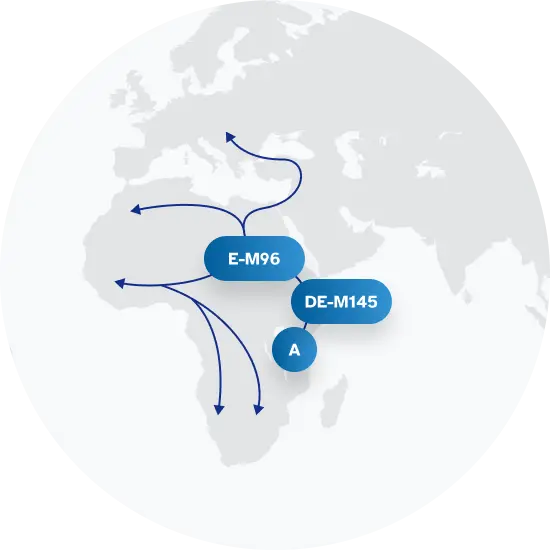Explore the Family Name Ratner
How common is the last name Ratner in the United States?
Based on the Decennial U.S. Census data, the surname Ratner has seen a rise in popularity over a decade. In 2000, it was ranked 14,137th and increased to 13,440th by 2010, a growth of 4.93%. The count of people with this surname also rose from 1,952 in 2000 to 2,266 in 2010, a notable increase of 16.09%. The proportion per 100,000 people grew by 6.94% from 0.72 to 0.77.
| 2000 | 2010 | Change | |
|---|---|---|---|
| Rank | #14,137 | #13,440 | 4.93% |
| Count | 1,952 | 2,266 | 16.09% |
| Proportion per 100k | 0.72 | 0.77 | 6.94% |
Race and Ethnicity of people with the last name Ratner
The ethnicity associated with the surname Ratner has also shown some changes according to the Decennial U.S. Census. Most people with this surname are identified as White, though there was a slight decrease of 1.55% from 96.82% in 2000 to 95.32% in 2010. An increase was observed among individuals identifying as Hispanic and Black, rising by 44.03% and 54.35% respectively. The percentage of people identifying as Two or more races also went up by 34.15%. However, the data for those identifying as Asian/Pacific Islander was suppressed for privacy in 2010 while the percentage of American Indian and Alaskan Native remained at zero for both years.
| 2000 | 2010 | Change | |
|---|---|---|---|
| White | 96.82% | 95.32% | -1.55% |
| Hispanic | 1.59% | 2.29% | 44.03% |
| Two or More Races | 0.82% | 1.1% | 34.15% |
| Black | 0.46% | 0.71% | 54.35% |
| Asian/Pacific Islander | 0.31% | 0% | 0% |
| American Indian and Alaskan Native | 0% | 0% | 0% |
Ratner ancestry composition
23andMe computes an ancestry breakdown for each customer. People may have ancestry from just one population or they may have ancestry from several populations. The most commonly-observed ancestry found in people with the surname Ratner is Ashkenazi Jewish, which comprises 62.4% of all ancestry found in people with the surname. The next two most common ancestries are British & Irish (14.4%) and French & German (7.3%). Additional ancestries include Eastern European, Italian, Vietnamese, Scandinavian, and Iranian, Caucasian & Mesopotamian.
Ready to learn more about your ancestry? Get the most comprehensive ancestry breakdown on the market by taking our DNA test. Shop 23andMe
| ANCESTRY BREAKDOWN | COMPOSITION |
|---|---|
| Ashkenazi Jewish | 62.4% |
| British & Irish | 14.4% |
| French & German | 7.3% |
| Other | 15.9% |

Possible origins of the surname Ratner
Your DNA provides clues about where your recent ancestors may have lived. Having many distant relatives in the same location suggests that you may all share common ancestry there. Locations with many distant relatives can also be places where people have migrated recently, such as large cities. If a large number of individuals who share your surname have distant relatives in a specific area, it could indicate a connection between your surname and that location, stemming from either recent ancestral ties or migration.
Based on 23andMe data, people with last name Ratner have recent ancestry locations in the United Kingdom of Great Britain and Northern Ireland and Ireland.
| RECENT ANCESTRY Location | Percentage |
|---|---|
| Tyne And Wear, United Kingdom | 34.80% |
| Glasgow City, United Kingdom | 34.80% |
| West Midlands, United Kingdom | 34.80% |
| Greater Manchester, United Kingdom | 34.80% |
| Merseyside, United Kingdom | 34.80% |
What Ratner haplogroups can tell you
Haplogroups are genetic population groups that share a common ancestor on either your paternal or maternal line. These paternal and maternal haplogroups shed light on your genetic ancestry and help tell the story of your family.
The top paternal haplogroup of people with the surname Ratner is E-L677, which is predominantly found among people with European ancestry. Haplogroup E-L677 is descended from haplogroup E-M96. Other common haplogroups include J-CTS5368 and E-M34, which are predominantly found among people with European and European ancestry. Other surnames with similar common haplogroups are: Fogel, Weisberg, Edelman, Hassan, Aronson, Rothman, Moskowitz, Berkowitz, Rothstein, Ibrahim.
The most common maternal haplogroups of people with Ratner surname are: K1a1b1a, H1, H. These most commonly trace back to individuals of European ancestry.
 Paternal Haplogroup Origins E-M96
Paternal Haplogroup Origins E-M96
Your paternal lineage may be linked to trans-Mediterranean migrants
Some of the early members of E-L677 completed a large, trans-Mediterranean migration directly from Africa as early as 11,000 years ago. This large migration is probably why haplogroup E1b1b1a1b2 is fairly common among people from both northern Africa and the Mediterranean region. During a more recent migration, haplogroup E1b1b1a1b2 probably spread from northern Africa to eastern Africa along the Nile River. The migrations of haplogroup E1b1b1a1b2 through Africa and Europe have resulted in its present-day widespread distribution throughout northern and eastern Africa, western Asia, and the Mediterranean.
Your maternal lineage may be linked to Marie Antoinette
Because it is so dominant in the general European population, haplogroup H also appears quite frequently in the continent's royal houses. Marie Antoinette, an Austrian Hapsburg who married into the French royal family, inherited the haplogroup from her maternal ancestors. So did Prince Philip, Duke of Edinburgh, whose recorded genealogy traces his female line to Bavaria. Scientists also discovered that famed 16th century astronomer Nicolaus Copernicus traced his maternal lineages to haplogroup H.

What do people with the surname Ratner have in common?
Spoiler alert: it's complicated. People with the same last name are usually no more genetically similar than a randomly sampled group of people from the same population. That said, people with the same surname are more likely to have similar ancestries than randomly sampled individuals. The reason is the tendency of people with similar cultural or geographical backgrounds to preferentially mate with one another. That's why people who share a surname may be more likely to share traits and tendencies in common than people within the general population. Check out the percentages below to see the prevalences of tastes, habits, and traits of people with your surname compared with prevalences among 23andMe users.
Preferences
Traits
Habits
Wellness

Migraine
A severe headache characterized by intense pain, sensitivity to light and sound, and often accompanied by nausea and vomiting.
"Ratner" Surname 14.0%
23andMe Users 16.4%
Are health conditions linked to the last name Ratner?
The short answer is that, if there is an association between surname and health, it's usually more about your ancestry than your name. Individuals with a given surname are no more genetically similar than the general population but often have similar ancestries. The populations of people associated with those shared ancestries often have sets of genetic variations, also known as alleles, in common. Some of those alleles are associated with a greater likelihood of developing certain diseases.
Disease variant frequency by ancestry
Disease allele frequencies in populations associated with the surname Ratner are shown below. Important Note: not everyone with a disease allele will develop these health condition







